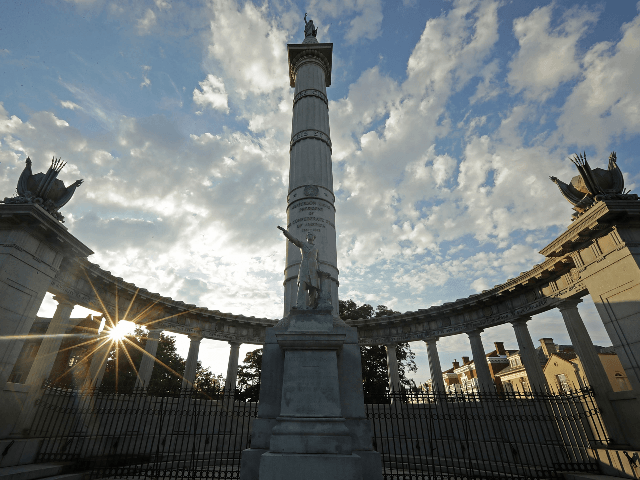The phrase “This is Racist” was reportedly found spray-painted on a Confederate monument in Richmond, Virginia, on Tuesday.
WTVR reporter Gabrielle Harmon tweeted photos of the Confederate President Jefferson Davis monument located on Monument and Davis avenues around 6:30 a.m.
THIS MORNING :@RichmondPolice were patrolling Monument Avenue.
One of the monuments: Jefferson Davis was found with Graffiti on it stating “ This is Racist” in blue paint.
Stay tuned to @CBS6 as this is a developing story. pic.twitter.com/Tkb2A692E9
— Gabrielle Harmon (@_GabbyHarmonTV) January 7, 2020
An hour later, Harmon tweeted a photo of the Confederate General Stonewall Jackson monument at the intersection of Monument Avenue and Arthur Ashe Boulevard which had the words “God is Gay” spray-painted on it.
Further down the street, another monument hit with Graffiti.
This time in red “God is Gay” @CBS6 pic.twitter.com/NbekgdX84y
— Gabrielle Harmon (@_GabbyHarmonTV) January 7, 2020
Monday, the Richmond City Council voted 6-2 to ask state lawmakers for permission to either modify, remove, or leave the monuments as they stood, according to WTVR.
“With removal never being on the table, there will never be a true dialogue,” said Councilman Michael Jones, who brought forth the resolution.
Jones’ resolution was rejected twice before, once in December 2017 and again in October 2018.
“One reason the resolution passed in this may be because the Virginia General Assembly flipped from Republican control to Democratic control during the November 2019 election,” the report said.
However, a judge in Charlottesville, Virginia, ruled in April that the city’s statues of Confederate generals were protected by state law.
In his nine-page ruling, Circuit Judge Richard Moore wrote, “I believe that defendants have confused or conflated 1) what the statues are with 2) the intentions or motivations of some involved in erecting them, or the impact that they might have on some people and how they might make some people feel.”
“But that does not change what they are,” he concluded.
In December, two Virginia Democrat lawmakers asked Gov. Ralph Northam (D) to remove General Robert E. Lee’s statue from the U.S. Capitol building in 2020.
“These statutes aimed to rewrite Lee’s reputation from that of a cruel slave owner and Confederate General to portraying him as a kind man and reluctant war hero who selflessly served his home state of Virginia,” wrote A. Donald McEachin and Jennifer Wexton.
“As Virginians, we have a responsibility to not only learn from but also confront our history. As part of this responsibility, we must strive for a more complete telling of history by raising up the voices, stories, and memories of minorities and people of color,” the letter concluded.

COMMENTS
Please let us know if you're having issues with commenting.